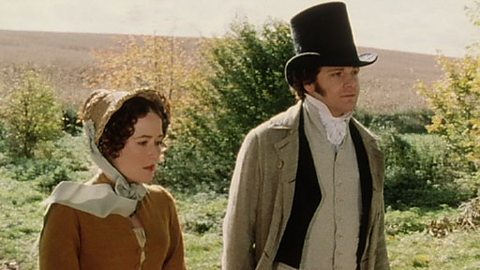Pride and Prejudice (1995): the second-chance romance
Pride and Prejudice: BBC’s 1995 miniseries gets it right
The very last adaptation I thought I’d ever write a blog on would be a Jane Austen story. You may or may not already be familiar with my disdain for Austen’s stories, so this post might come as a relative surprise. However, I’ve recently been a bit more open-minded about Austen, having watched the 1995 BBC miniseries adaptation. Colin Firth may or may not have had something to do with that decision but that’s for me to know and you to wonder. I was not enchanted by Pride and Prejudice when I first read it many years ago, and I have to say the 2005 film did not help matters at all; the BBC miniseries, however, I think gets it right.
Jane Austen, for her time as for ours, wrote to entertain. She wrote the stories she wrote because people expected to be entertained by books written by women. Because obviously women can only write frivolous drivel with no bite or backbone. Because obviously women can only write about topics that are relevant to women, like homemaking and the latest gossip in town. So of course Jane Austen took the brief and decided that she would, in fact, write about a topic which women were highly knowledgeable in, that topic being other people’s business. But what better subject for entertainment than other people’s business! Modern audiences can certainly appreciate that.
So what does the miniseries get right where other adaptations have failed? Well, Pride and Prejudice is all about people, and how their characters evolve and mature, how changes in a community have ripple effects, how relationships blossom and how relationships grow and change. The miniseries form, by virtue of being episodic, gives creatives the space to make sure all of that gradual change can happen in the story and its characters and so that those changes make sense and are meaningful. Asking audiences to believe that two people who decidedly dislike each other will suddenly (over about two hours) fall truly in love with one another in a complete emotional U-turn requires a huge suspension of disbelief. The miniseries mitigates that somewhat: instead of two, there are about six hours to work with. In that time we get to see people’s minds and hearts change with new information, and the pacing of those developments means they are truly meaningful and impactful. So there’s the element of storytelling and character development to think about.
Next, the slow-burn romance which Pride and Prejudice is such a strong champion of. It’s kind of a dead-giveaway: if it’s a slow-burn, it needs to be drawn out. Basic. Particularly since Elizabeth Bennet and Mr Darcy so strongly dislike each other at the beginning of the story, a lot of work needs to go into their relationship in order for us to believe they have genuinely changed their minds. There’s a whole plotpoint relating to this idea that love needs time to grow into something that is truly valuable, as opposed to just attraction. (Spoilers incoming - you have been warned.) When Darcy first proposes to Lizzie, the shock of it all is not just Lizzie’s, it’s ours too. And Lizzie’s rejection of him makes sense; Darcy’s done nothing but disdain her and her peers, including insulting her family, so who in their right mind would agree to marry such a person? By the time all the misunderstandings have been ironed out and the two of them have come to terms with their feelings enough to commit themselves to each other, everything falls into place quite simply and satisfactorily. At the close of each episode, the audience gets time to reflect on new developments, in quite the way we might imagine our main protagonists have time to think about the new information they have. In a feature film, we don’t have that time to reflect because we’re already moving on. In other words, the film makes us watch passively, whilst the miniseries gives us space to think for ourselves, parallel to the characters’ experiences we’re following. The result is we can be more invested in the story because we truly feel like we’re living those experiences alongside our characters.
Looking back now, I have to say that I was in fact prejudiced against this story, and have had to overcome my pride on that matter and accept that a version of it exists that’s pretty decent. Now that’s poetic justice I really can’t make up. I’ve not quite been convinced to re-read Pride and Prejudice but I admit I leave you now with a more open mind. (Although, saying that, if anyone would like to send me a copy of the Bill Donovan illustrated edition I guess I’d have to try it again…) Anyway, here's to second chances.



Comments
Post a Comment